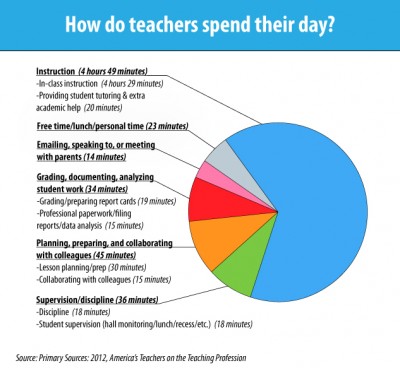Teachers are skeptical about several of the major reform ideas the Obama administration and education activists are pushing to turn around the nation’s struggling schools, a new survey commissioned by Scholastic and the Bill & Melinda Gates Foundation has found. (Disclosure: the Gates Foundation is among the many funders of The Hechinger Report.)
Fewer than a third of teachers believe reforms like longer school days or years and merit pay for teachers will improve student achievement, the survey found. Under half of those surveyed believe common assessments across all states will help. Common standards also ranked low on the list of reforms that teachers see as important.
 All of these strategies have been key requirements in two major reform pushes by the federal government, the Race to the Top competition and the School Improvement Grant program. The federal government has invested billions of dollars in these reform efforts.
All of these strategies have been key requirements in two major reform pushes by the federal government, the Race to the Top competition and the School Improvement Grant program. The federal government has invested billions of dollars in these reform efforts.
The strategy supported by the greatest number of teachers is increasing “family involvement and support.” Eighty-four percent of teachers say that would have a “very strong impact”—and 14 percent say it’d have a “strong impact”—on student achievement. High expectations, effective and engaged principals and fewer students in each class are other strategies supported by a large majority of teachers.
More than 10,000 public-school teachers, from pre-k to 12th grade, completed the online survey last summer. Respondents received a Scholastic gift certificate in exchange for participating, and the results were weighted to be nationally representative of the U.S. teaching force. Teachers reported, on average, a workday of 10 hours and 40 minutes. Roughly two-thirds of that time is spent at school during required hours, while the other third—or more than three hours daily—consists of working at home or at school after-hours.
The survey results overlap with the findings of another teacher survey published recently, the MetLife Survey of the American Teacher. In both surveys, teachers reported that more of their students are dealing with hunger and homelessness. Both surveys also found that fewer than half of teachers are “highly” or “very” satisfied with their jobs.
Despite apparent skepticism around some of the Obama administration’s reform strategies, teachers appear to approve of the recent national focus on overhauling teacher evaluations, albeit with some caveats. Eighty-five percent of teachers questioned in the Scholastic/Gates survey support the use of student academic growth to evaluate their job performance. Nevertheless, only a quarter of teachers believe standardized tests are “an accurate reflection of student achievement,” suggesting that teachers are unlikely to support the complicated statistical models that many states are adopting to measure teacher performance based on student standardized test-results.
In addition, teachers seem wary of another increasingly popular strategy for evaluating teachers: principal observations. Although teachers appear to welcome more frequent principal observations—95 percent say these should happen annually—fewer than a third think that principal observations should count for a lot in their evaluations.
Teachers instead seem to want more varied and intense evaluations than reformers are calling for. They would like to have more self-assessments, peer reviews and evaluations by their department chairs. The survey results also show widespread support of teacher tenure, which has come under attack from politicians in some states. Still, the survey suggests that many teachers might accept changes to how tenure is currently granted: Nearly 90 percent say tenure “should reflect evaluations of teacher effectiveness,” and even more say “that tenure should not protect ineffective teachers.”



